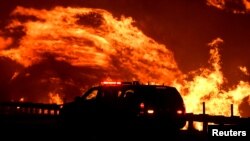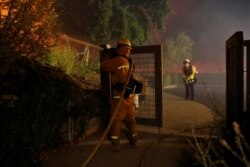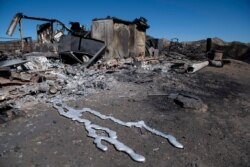California is bracing for "extreme" and "potentially historic" winds, the National Weather Service warned Saturday. State officials in the wine region ordered evacuation of at least 50,000 more people as a nearby wildfire continued to burn.
In addition, millions more California residents will face power outages as utility company Pacific Gas & Electric decided Saturday afternoon to begin mass power shutoffs. The shutoffs will affect nearly 1 million customers, affecting nearly 3 million people, and will include San Francisco, California's wine country and the Sierra foothills.
In the past month, PG&E has shut down power to thousands of consumers to try to contain the spread of the fires. PG&E is in bankruptcy because of liability from recent major wildfires, including one last year that killed 85 people in the northern California town of Paradise.
Forecasters said hot, dry winds, some as strong as 112 kph (70 mph), were expected to start late Saturday and last into Monday in the San Francisco Bay Area. The National Weather Service warned the winds, often called Santa Ana or Diablo winds, might be a record event.
Lengthy period
"This is definitely an event that we're calling historic and extreme," David King, meteorologist for the U.S. National Weather Service, told the Los Angeles Times. "What's making this event really substantial ... is the amount of time that these winds are going to remain."
"The weather event could be the most powerful in California in decades," PG&E said Saturday, adding, "PG&E will need to turn off power for safety several hours before the potentially damaging winds arrive."
"Winds of this magnitude pose a higher risk of damage and sparks on the electric system and rapid wildfire spread," the utility said.
Cal Fire Division Chief Jonathan Cox warned the high winds could also lead to the grounding of water-dropping aircraft, as well as the driving of hot embers far ahead of the flames, setting new blazes, the Associated Press reported.
California Governor Gavin Newsom declared a state of emergency in both Sonoma and Los Angeles counties Friday. No injuries have been reported from either fire.
2 towns in evacuation order
On Saturday, the Sonoma County Sheriff's Office issued the latest evacuation order, which they said would be the largest in the county in more than 25 years and include the entire towns of Healdsburg and Windsor.
In a visit to the communities affected by the Kincade Fire on Friday, Newsom expressed frustration with PG&E, saying the company "simply did not do their job."
The company has said its electrical equipment may have caused the Kincade Fire, despite pre-emptive power outages to try to avoid a fire.
PG&E sent an "electric safety incident" report Thursday to the California Public Utilities Commission, saying that one of its power lines malfunctioned at about the time and location as the origin of the Kincade Fire.
The company said that while it shut off power to much of the region, it did not de-energize the transmission line that malfunctioned.
Firefighters are battling wildfires in Northern and Southern California, from Sonoma County to Los Angeles.
Severe damage
The California Department of Forestry and Protection said about 2,000 firefighters were battling the Kincade Fire, located near Geyserville, about 120 kilometers (77 miles) north of San Francisco. The fire was only 10 percent contained by Saturday. Officials said the fire had destroyed 49 buildings, including 21 homes, and scorched nearly 104 square kilometers (25,700 acres) of the state's wine-growing region.
In Southern California, the Tick Fire threatened Santa Clarita, just north of Los Angeles. Residents who had been ordered to evacuate were allowed back to their homes on Saturday. The fire scorched about 16 square kilometers (40 acres) and forced the closure of schools and a major freeway on Friday.
No injuries were reported caused by the Tick Fire.
Across the border, in Mexico's Baja California state, officials said wildfires killed three people and destroyed 150 homes.
Antonio Rosquillas, the state's director of civil protection, told the French news agency AFP on Saturday that Tecate, on the U.S.-Mexico border, was hardest hit by the wildfires.











